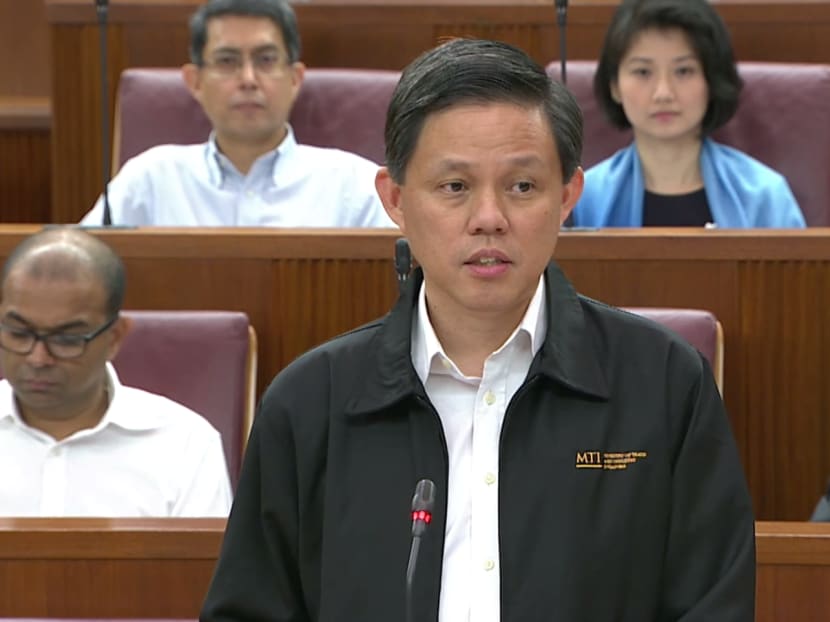Trade war’s impact on S’pore not easily quantified; ‘sustained disruption’ unwelcome: Chan Chun Sing
SINGAPORE — While the net impact of the United States (US)-China trade spat on Singapore’s economy and its workers is “less easily quantified” given the fluidity of the situation, Trade and Industry Minister Chan Chun Sing said on Monday (July 9) that the Government’s greatest concern is the impact from “an escalation of the trade conflict into a vicious cycle of tit-for-tat measures between major economies”.

Minister for Trade and Industry Chan Chun Sing was addressing questions from Members of Parliament on the fallout from the trade war between the world's top two economies.
SINGAPORE — While the net impact of the United States (US)-China trade spat on Singapore’s economy and its workers is “less easily quantified” given the fluidity of the situation, Trade and Industry Minister Chan Chun Sing said on Monday (July 9) that the Government’s greatest concern is the impact from “an escalation of the trade conflict into a vicious cycle of tit-for-tat measures between major economies”.
He was addressing questions from Members of Parliament (MPs) on the fallout from the trade war between the world's two largest economies. The US and China slapped tit-for-tat duties on US$34 billion (S$46.3 billion) worth of the other's imports on Friday, with American President Donald Trump warning that the US may ultimately target over US$500 billion worth of Chinese goods.
Mr Chan said the authorities expect a “modest” net impact on Singapore, based on the assumption that tensions between both sides do not escalate.
“On the whole, bilateral trade between the US and China indirectly contributes to 1.1 per cent of Singapore’s Gross Domestic Product, and any sustained disruption is unwelcome for the region,” he said in Parliament on Monday.
The Government’s economic agencies are working with firms to identify disruptions and restructure their supply chains, where necessary, added the minister.
The trade conflict between the US and China are expected to affect Singapore on three levels.
Firstly, about 0.1 per cent of Singapore’s total domestic exports will be hit by US tariffs applied globally on a series of products, including solar cells and modules, washing machines, steel, and aluminum.
“While this is relatively modest, specific Singapore-based companies in the general manufacturing and electronics sectors that export such products to the US will become less competitive compared to manufacturers in the US when the tariffs are added on,” said Mr Chan.
The Ministry of Trade and Industry’s (MTI) agencies are supporting affected firms in their waiver applications, and in exploring alternative markets, he said.
Firms can apply to the US Trade Representative to have their products excluded from the tariffs.
Secondly, tariffs that do not directly affect Singapore’s exports may also have “spillover impact” due to the Republic’s role in global supply chains, said Mr Chan.
For instance, Singapore firms that produce intermediate goods used to manufacture products that China exports to the US may see softer demand for their goods.
However, Mr Chan noted that there could be potential for firms to “mitigate some of the impact” by redirecting exports of these intermediate goods to markets outside China.
Traders in China who now find imports from the US less attractive due to the tariffs may now turn to South-east Asian countries to source their inputs.
“The complexity of global value chains is also such that amid disruptions, there will be potential for firms to mitigate some of the impact by redirecting exports of intermediate goods to other markets… There is therefore some offsetting effect,” said Mr Chan.
Singapore’s “greatest concern”, added the minister, has to do with the third level of impact, which could occur if the trade conflict spirals into a cycle of “tit-for-tat measures between major economies”.
Upon reaching a tipping point, these measures could cause a “sharp and sustained” fall in business and consumer confidence worldwide, and tighten global liquidity conditions.
“In this scenario, the impact on global consumption and investment, on top of the disruption of trade flows, will significantly impact Singapore’s open economy,” warned Mr Chan.
Amid the trade tensions, a majority of economies remain committed to the World Trade Organisation’s multilateral trading system, he said. Even the US has stated its openness to bilateral trade agreements, and has been sharing its views on improving the rules-based multilateral trading system.
Singapore is “in good standing with all our trading partners”, including the US and China, said Mr Chan. It will continue to work with like-minded trading partners to uphold the multilateral trading system and pave the way for regional integration, in order to bring about more opportunities and growth, he added.






